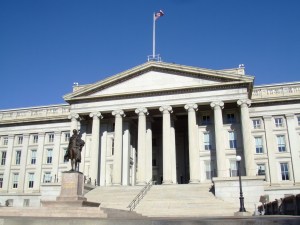How a Treasury office’s incubator encourages a culture of tech curiosity

The Bureau of Fiscal Service’s Office of Revenue and Collections Management (RCM) has found a unique way to keep an eye on emerging technologies and their potential to improve federal revenue collection.
Over the past few years, employees have experimented with chatbots and robotic process automation. They’ve even built a mobile app. And all this in addition to their actual day-to-day work.
The mechanism is an incubator program that RCM founded in 2014. RCM’s assistant commissioner, Corvelli McDaniel, laid out the vision.
“The goal is to foster public-private coalitions to basically develop e-commerce products for the government,” Joe Edwards, the incubator’s sole program manager, told FedScoop.
Practically speaking the incubator is a sort of research and development lab within RCM where interested employees can come together with experts from private companies (often financial institutions) and academia in a cohort organized around a specific topic or technology. Over the course of three months, the group works together to build out a proof of concept.
Each cohort kicks off with a directive from management — a prompt focused either on an internal agency pain point or a challenge in the way people interact with the agency, Edwards said. The first round in 2014, for example, worked to “design a project around mobile apps.”
“We didn’t have have any kind of mobile presence, we didn’t have any mobile apps in 2014,” said Edwards, who was a participant in that initial cohort. Now, that’s changed.
In the first week of the program, participants (there were about 15 in that first round, and similar numbers in subsequent rounds) brainstorm. And on the first Friday, the group enters a “Shark Tank”-style pitch session — they present the project ideas they’ve come up with and office leaders decide what makes the cut.
Until the most recent round, the whole group worked collectively to develop one proof of concept. The latest cohort — cohort number five — switched it up a bit and divided the group between one chatbot project and two robotic process automation integrations. A lot of the prototypes, Edwards said, have moved into production within the agency.
The incubator’s participants aren’t necessarily tech people, Edwards told FedScoop.
“The nice thing about the incubator is it brings together employees who might have exposure to some of these technologies and also employees who might not think of themselves as technical,” Edwards said. “And over the course of three months we help to get everybody on board with the fact that anyone can be technical.”
The program serves as a way to keep up with the latest in technology, but it’s also a way to encourage a culture of tech curiosity at RCM. “It’s been a great way to engage employees,” Edwards said. Initially, he admitted, he had some reservations around how it would work. But as the program gets more established, interest in it grows.
“We definitely have a lot of demand for people to be on the team,” he said.






